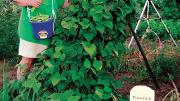After a punishing winter, time for spring themes: Baseball Maverick, by Steve Kettmann (Atlantic Monthly Press, $25), a portrait of the New York Mets’ general manager, Richard (“Sandy”) Alderson, J.D. ’76. It would be fun to eavesdrop on his Law School reminiscences with Robert D. Manfred Jr., J.D. ’83, now the commissioner of Major League Baseball. For those tending greenery other than infields, The Tao of Vegetable Gardening, by Carol Deppe, Ph.D. ’74 (Chelsea Green, $24.95 paper), is a confidence-building guide to the karma of kale.
Strategy Rules, by David B. Yoffie, Starr professor of international business administration, and Michael A. Cusumano (Harper Business, $29.99). Yoffie, of the Business School, a member of Intel’s board of directors, and Cusumano, of MIT’s Sloan School, tease out lessons from Bill Gates ’77, LL.D. ’07 (Microsoft), Andy Grove (Intel), and Steve Jobs (Apple). The leaders’ distinctive traits shape their companies still: Gates as the pragmatist (hence all those tinkering software releases); Grove, the precise engineer and manufacturer (ideal for computer chips); and Jobs, the design perfectionist.
Two sobering analyses of deteriorating economic prospects and the wrenching conditions of work for many Americans: In Our Kids: The American Dream in Crisis, by Robert D. Putnam, Malkin professor of public policy (Simon & Schuster, $28), the author of Bowling Alone considers the Port Clinton, Ohio, of his boyhood, when socioeconomic barriers “were at their lowest ebb” in a century—and how the rich and poor now face “radically disparate” opportunities. Allison J. Pugh ’88, G ’91, associate professor of sociology at the University of Virginia, conducted deep interviews for The Tumbleweed Society: Working and Caring in an Age of Insecurity (Oxford, $27.95). Precarious and part-time employment affects not only life on the job, she finds, but also the demands placed on intimate relationships—deepening insecurity and tensions.
Matters of faith: How to Read the Bible, by Harvey Cox, Hollis research professor of divinity (HarperOne, $26.99), combines literary, historical-scholarly, and activist lenses to engage with the foundational text. Kevin J. Madigan, Winn professor of ecclesiastical history, has termed Medieval Christianity: A New History (Yale, $40) a textbook, but it reads as something beyond that dreary genre; medieval Christianity, he notes briskly, was by the early seventh century “the distinguishing and unitive religious and cultural mortar of European society.”
Move, by Rosabeth Moss Kanter, Arbuckle professor of business administration (W.W. Norton, $26.95). The subtitle, “Putting America’s infrastructure back in the lead,” points beyond filling potholes and mending bridges. Kanter describes smart transportation systems that could boost competitiveness and prosperity.
Something Must Be Done about Prince Edward County, by Kristen Green, M.P.A. ’09 (Harper, $25.99). A veteran journalist revisits her Virginia hometown to recount its extreme reaction to Brown v. Board of Education: closing its public-school system rather than integrating it. A vivid reminder of how things were, not so very long ago.
The Antibiotic Era, by Scott H. Podolsky, associate professor of global health and social medicine (Johns Hopkins, $34.95). The director of the Center for the History of Medicine at the Countway Library comprehensively reviews the “wonder drugs”; attempts to limit their overuse; and the ever-looming issue of resistance (see “Superbug: An epidemic begins,” May-June 2014, page 40).
The Ocean, the Bird, and the Scholar, by Helen Vendler, Porter University Professor (Harvard, $35). In this collection of essays on poets and poetry, the nation’s leading critic begins by accounting for “the three most intense episodes of my own learning,” and then engages with W. B. Yeats, Jorie Graham, Allen Ginsberg, Seamus Heaney, Wallace Stevens, A.R. Ammons, and many others. New readers of her reviews will discover a firm guide in an era when American culture remains “as yet too young to prize poetry.”
Speak Now: Marriage Equality on Trial, by Kenji Yoshino ’91 (Crown, $26). The author (Warren professor of constitutional law at NYU, a member of the Board of Overseers, and a married gay man) plumbs Hollingsworth v. Perry. The case struck down California’s ban on same-sex marriage and was the first federal trial on the subject. Timely, given the Supreme Court’s current docket.
Muse, by Jonathan Galassi ’71 (Knopf, $24.95). A debut novel, focused on publishing rivals and a poet, by the poet, translator, and president and publisher of Farrar, Straus and Giroux (profiled in these pages in “High Type Culture,” November-December 1997, page 38).
The Cherokee Rose: A Novel of Gardens & Ghosts, by Tiya Miles ’92 (John F. Blair, $26.95). The author (a MacArthur Fellow and University of Michigan professor in American culture, Afro-American and African studies, Native American studies, and more) turns to fiction to explore Cherokee ownership of black slaves, a subject of her scholarship, too.








